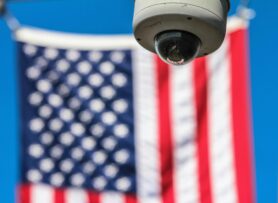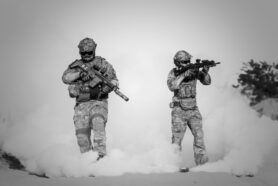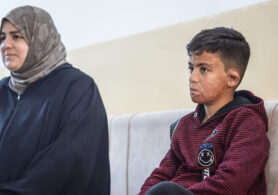‘That really appeals to me . . . that I am part of shaping the military of the future’
This is the expression of a soldier at the Robots and Autonomous Systems (RAS) unit of the Dutch Army. The RAS unit embodies the Dutch military’s ambition to become a “technologically advanced” armed forces with “a strong innovative capability” to tackle the increase of “worldwide, physical and digital threats”. This is not merely a vision, these ideas have translated into policies, budgets, and resources – and innovation hubs such as the RAS unit.
In their latest article in Science, Technology, & Human Values, Sofie van der Maarel, Désirée Verweij, Eric-Hans Kramer, and Tine Molendijk explore visions, practices, and experiences at the RAS unit through an integrated framework of sociotechnical imaginaries and a sociology of expectations.
They observe a discrepancy between large-scale imaginaries and expectations of military innovation, how these play out in day-to-day activities in the innovation hub, and how soldiers experience this.
The article outlines how “innovation” and “military” imaginaries are integrated so that technological innovation is presented as necessary, desirable, and inevitable for military futures. Furthermore, the article explores friction between the strategic and operational levels. At the strategic level, soldiers experience meaning and purpose in their work, whereas at the operational level, soldiers’ expectations, practices, and experiences do not align with the “innovative military future” imaginary, resulting in disillusionment.
Operational soldiers struggle with the practical challenges of experimenting with prototype technologies that are often not (yet) fully functional. While the unit explores new modes of operation, a commander stated: ‘those boys in the platoon are not an experiment to me.’
Additionally, robots, drones, and autonomous systems allow for increased remoteness and datafication of warfare, where soldiers are expected to operate from a safe distance or even from behind a computer screen. This study shows that while soldiers join the military to fight in ‘real’ operations – like those in Afghanistan and Iraq – they realize that these technologies diminish the action they seek in their work. Consequently, they question their role in 21st-century warfare, and wonder: ‘is this what I became a soldier for?’
Van der Maarel, Verweij, Kramer, and Molendijk thus show that large-scale transformations towards ‘algorithmic’ or ‘virtual’ warfare are not merely visions of the future: they already change soldiering on the ground, resulting in realities that in turn contribute to the transformation of warfare.
This study is part of a broader NWO-NWA research project on the contextual dimensions of moral injury. Find the full open-access article by clicking on the reference below.
Image source: Ministerie van Defensie



